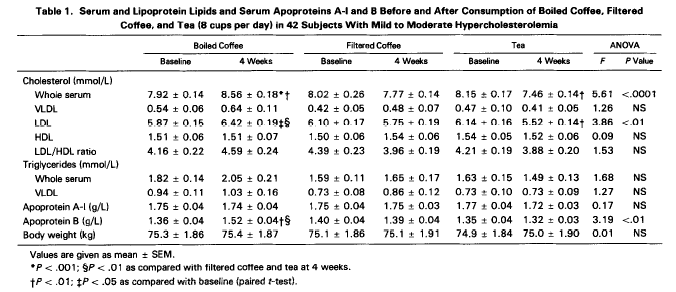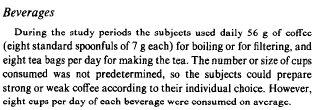According to Dr. Paul Mason who referred to a study done (will link to it when next I am on a computer), boiling your coffee apparently increases your serum low density lipoprotein concentration, whereas filtered coffee does not. This was news to me. Any thoughts on this anyone? I’ve been boiling my coffee this whole time in a pan before filtering it in my French press, since the start of my ketogenic WOE.
Boiled coffee increases serum low density lipoprotein concentration?
News to me, too. Would like to read such a study and better understand what was done to reach such a conclusion. 
How does the body know how the coffee was prepared?
Will link to it when I am on a computer, am typing on my phone at thevmoment. It was Dr. Mason Paul who referred to it on twitter. I had never heard such a thing.
Not a clue, Paul. But I’ll link to the study when next I have access to a computer. Maybe you can make more sense of the study than I can, but perhaps boiling the coffee is a bit similar to what happens to seed oils when heated? That’s just a wild guess. I haven’t even had the time to read the study properly myself yet.
It’s just a wild guess, I could be completely wrong, but I thought perhaps it was a matter of oxidation, will have to read the study tomorrow (it’s 22:22pm here and I’m off to bedfordshire).
Here is the link to the study:
Thanks for the link!
Unfortunately, the paper itself (from 1987) is still kept behind a paywall and the abstract provides no info on how large the effect on LDL is.
To say an effect is “statistically significant” does not mean it is a meaningful effect.
E.g., if one is 99.99% confident that there’s a risk reduction on the order of one-thousandth (1/1000th) of a percent, well, that is a highly significant confidence level for a statistical test… but it doesn’t make the risk reduction particularly compelling. Should that change one’s behavior?
Since the authors do not disclose what the actual change in LDL was when boiled coffee was substituted for filtered coffee, it’s impossible to gain much insight from merely reading the Abstract.
This, plus the fact that LDL is (in the view of most recent studies) of little consequence in terms of heart health, also makes it hard to draw conclusions about coffee choices.
What’s more, since mortality is lower with higher LDL in older patients (not higher) perhaps it’s time to switch to an LDL-enhancing java. 
Hi Joey, I might have misunderstood something, but it was the low density that got me, as I immediately thought about the LDL particles. It seems from what Dr. Paul Mason has been saying regarding LDL that LDL in itself is not a problem if it increases. Like Dr. Malcolm Kendrick he too believes high cholesterol can be protective and beneficial, it is the amount of damaged, oxidised LDL. So, since I’d only read the abstract, and skimmed it at that as it was late last night and my eyes were glazing over, I wondered if the reason Dr. Paul Mason referred to the study in a twitter post (he must’ve seen some significance in it) that it had been discovered boiling the coffee caused oxidation to the LDL, in a similar way to how seed oils when heated, cause oxidation to our LDL. But I’d have to properly read the study. Also though, if it was significant, I’m surprised Mason hasn’t mentioned it more in one of his videoes, he mentions lectins and seed oils and the damage they can do, but I’ve yet to hear him talk about the danger of boiling your coffee.
Then again I’m sure people have been boiling their coffee a lot longer than filtering it. Perhaps it’s just a gimmick to get people buying coffee machines and coffee filters, who knows.
it’s not actually about the boiling, it’s about the filtering. Filtering removes a certain type of oil that is found in the coffee bean that contains cafestol and kahweol, which are theoretically problematic.
So if I boil my ground coffee, and then filter it in my french press, I should still be OK …
I have, however been listening to Paul Saladino and his concerns regarding coffee consumption, so am thinking about cutting down. It is addictive, as so many things are. I have cut down from 4 cups a day to 2, but I am hard pressed to give up those last two cups, as I really enjoy (1) the warmth (2) the taste. It doesn’t actually make me feel more awake so a caffeine rush is not why I drink it at all. But I do feel my mind is clearer on caffeine, the energy level stays the same.
Oh, yeah. I have experimented lately with reducing or removing caffeine from my diet. I don’t like it at all. The removal, that is. I have settled on one cup of coffee a day, and maybe some green tea If I’m feeling particularly soggy. I feel like there’s as much evidence in favor of it as against, for the moment the clarity and energy it provides is so welcome I’m not going cold turkey.
I’ve done the same, reduced coffee consumption to almost zero, then upped it again. I have 1 cup coffee and 2 cups pu-erh tea now.
By the way, they drank 6 cups of coffee a day in that study, well beyond what I drink or ever drank. And I drink cold brew, so I’m not sure what that does. But as someone with low LDL, I’d like to see mine higher.
Yes, for me too it’s the clarity. My brain without caffeine is a really sad thing to behold, and my cognitive capacity is still not all that great (memory). But I am also on a medication I can’t get off which exacerbates all this. And I have my two little boys to look after as a stay at home mum, it’s a fulltime job when they’re not in school, so I really really need the cognitive clarity caffeine gives me. I have actually tried to quit cold turkey, but I went full on zombie so I suppose caffeine does affect my energy levels, and everyone noticed. I lasted 2 days caffeine free.
Anyway, some days now I have two cups of coffee, and other days just 1. So I’ve probably already greatly reduced the level of toxicity to the point where it’s perhaps negligible. Then there’s tea, the cheap shop bought kind, who’s to say that’s healthy, and yet, I’ve been drinking green tea for years, because I enjoy the taste.
It seems the subjects drank 8 cups a day. Would that be equivalent to 4 mugs? Those cups must’ve been very small, because 8 cups sound like a lot. I’m sure coffee on a whole lot of levels could become toxic at those excessive amounts.
I’d like to see my LDL higher too, as believe it’s beneficial. But I thought the study was about the low density LDL particles increasing through boiling the coffee?
The study should tell the size of the cups involved, preferably in mL. If they were using traditional measures, one American cup is 8 oz., and an Imperial cup is 10 oz. That seems a lot. The American coffee makers I’m familiar with count a “cup” as 6 oz. I had one that claimed to make 12 cups, but it only held 60 oz. of water, not 72, so it was lying, lol! 



I see many problems with this study. One is that they assume cholesterol values don’t change during the time the people are drinking their normal amount. I would’ve liked to see a one-month run in period, where they take multiple (at least 2, preferably more) cholesterol readings to see what the variance is normally. As we know now, these values are highly variable.
If you just look at the baseline values for LDL, they change from 5.87 to 6.1 to 6.14. So, it’s unclear to what extent this normal variance would affect the results.
The differences aren’t huge. A +9.4% difference for boiled coffee and -5.7% difference for filtered coffee.
They don’t postulate as to why the boiled coffee is “worse”. They give theories (longer time water is contact with grounds, for instance), but don’t say why.
Edit: “Cups” seems to be more like “servings”, as it’s whatever they would normally drink:

By the way, this is one of the problems with saying that coffee is bad for you. Finland has the highest coffee consumption in the world, yet is 16th in longest life expectancy on the first list here:
The US is 234th.
If coffee is doing something bad, it’s hard to see what that is, at least from life expectancy.

